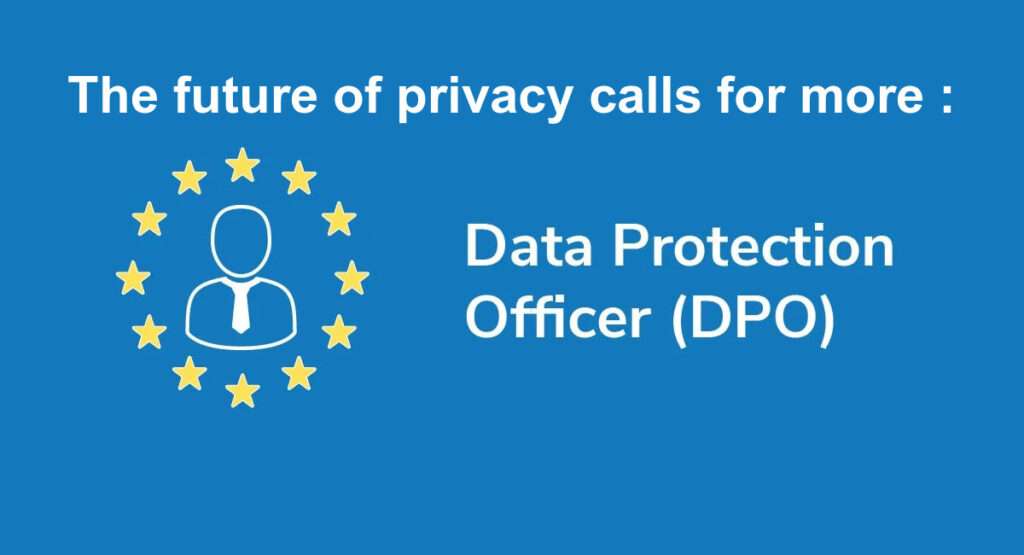In 2022, more than 4,100 publicly disclosed data breaches occurred which convinces the fact that data is valuable in this evolving digital era as it can provide potential revenue and business value. Since companies buy and sell data sets, it is promising that data has value.
So, who is responsible to protect these data?
The data breach incidents significantly led to the need for Data Protection Officers (DPO) who help organizations to comply with data protection laws and minimize the chances of breach. They also serve as a point of contact between the company and the supervisory authority that oversee activities related to data.
WHY HIRE A DPO?
The General Data Protection Regulation (GDPR) mandates the appointment of a Data Protection Officer. As soon as GDPR came into existence the International Association of Privacy Professionals (IAPP) estimated that more than 28,000 DPOs will be needed in Europe and the US and as many as 75,000 around as a result of GDPR.
If a company processes data on a large scale, then the company irrespective of the geographical barrier has to appoint a DPO to comply with the laws to minimize the breach and protect the data of the EU citizens, who not only protect the data but also prevents the companies from huge penalties. They are also responsible for breach reporting, in which they respond in case of data breaches.
DPOs are also responsible for conducting audits, and Data Protection Impact Assessments (DPIA), they also oversee data privacy and protection policies and make sure the company processes personal data in compliance with the laws.
A company appointing a DPO ensures the privacy of the customer’s data. It creates trust among the customers which acts as a big role in privacy, where there is transparency in the collection and use of customer’s data. In short, DPO is an independent employee who ensures that the company is compliant with laws.
WHAT THE FUTURE HOLDS?
According to Gartner, it is estimated that by 2023, 65% of the world’s population will have modern privacy regulations protecting personal data.
Before GDPR came into effect in 2018, there were only a few thousand official privacy officers. By 2019, it was estimated that globally already half a million organizations were relying on the expertise of a privacy officer.
Following GDPR, many privacy laws were introduced across the world, where the importance of data privacy and protection has paved way for new legislation to come up, which is convincing that the role of DPO is anticipated to grow.
A year later, the introduction of GDPR, the Data Protection Officer was ranked as the second highest emerging job according to LinkedIn’s 2020 emerging job report.
According to United Nations Conference on Trade and Development (UNCTAD), out of 194 countries only 137 countries have put in place legislation to secure the data.
So, what do these stats imply?
From these stats, it is evident that the role of the Data Protection Officer (DPO) is booming.
Because there will be new legislation passed in many countries where 9% of the countries have draft legislation according to the United Nations Conference on Trade and Development (UNCTAD) which will eventually come into effect. One such example is the Digital Personal Data Protection (DPDP) Bill, 2022 in India which is expected to be enacted as a law that also speaks about the appointment of a Data Protection Officer (DPO) by companies of large size that has an objective to comply with the laws.
This means that in the future there will be a demand for the position of Data Protection Officers, where protecting personal data became a significant factor in this digital era. As new technologies evolve, which mostly process personal data the need for protecting the data will increase which in turn will increase the role of Data Protection Officers to comply with privacy laws.
HOW CAN YOU BECOME ONE?
For a person to become a Data Protection Officer, there requires an in-depth understanding of the data protection laws and understanding data operations and security. Since they are appointed to ensure compliance with the law in a company, it is considered to be a crucial role. So, becoming a Data Protection Officer requires the understanding of technology, information technology infrastructure, and technical, organizational structure, experience in the field of compliance is an advantage that there is a higher chance of you becoming a Data Protection Officer.
What happens if a company doesn’t appoint a Data Protection Officer?
If a company fails to appoint a Data Protection Officer, then the company is open to a high risk of penalty, if they fail to comply with law. They help in the protection and privacy of the data of the customers. As new privacy legislations are coming up, there will be a demand for highly skilled Data Protection Officers.
So how can you become a highly skilled Data Protection Officer?
Tsaaro Academy comes to the rescue.
Tsaaro is a one-stop solution for you to become a Data Protection Officer. To have a strong understanding of data protection and privacy, the CT – DPO foundation course gives you a head start. It covers the basic principles of data protection and privacy, the terminologies associated with privacy, the role of data controllers and processors, the Data Protection Impact Assessments (DPIA), the concept of privacy by design, data breaches, etc.,
Acquiring certifications related to Data Protection and privacy will enhance your knowledge, and helps you understand the nuances of the privacy field. It acts as a factor of acknowledgment that you have a strong understanding of the relevant concepts. It makes you stand out in the recruiting process if you’ve acquired such credentials while applying for the position of Data Protection Officer.
Tsaaro’s cutting-edge, data-driven compliance solutions assist businesses in securing all of their sensitive data, implementing privacy by design, supporting their privacy framework, and achieving compliance at scale.
Without the assistance of specialists and professionals, your business cannot protect itself from data breach activities, making it an easy target for scammers. We will let you know what has to be fixed and how, and take care of the implementation. Get in touch with us at info@tsaaro.com to know about our services.






